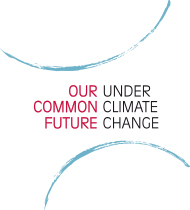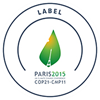�
Our Common Future Under Climate Change
International Scientific Conference 7-10 JULY 2015 Paris, France
A jatropha farmer from northern Zambia (Jeff Walker - CIFOR)
Are biofuels really climate-friendly?
201508-31
By By Laura Mukhwana and Olivier Hamerlynck
A Canadian company planned to clear 64,000ha of Somali-Masai Acacia-Commiphora bushlands and plant Jatropha curcas on the terraces of the Tana River Delta, Kenya. They claimed that it is climate friendly and would use the �unproductive� land. However, this conversion would release a large amounts of carbon and negatively impact local communities� livelihoods.
Increasing global interest and demand for biofuels caused what some researchers refer to as �land grabbing�. Foreign investors got large tracts of land in developing countries to produce biofuels mostly for export to developed countries.�
Biofuel supporters promoted them as being climate friendly, a clean development and reducing rural poverty especially in the developing world. A lot of uncertainty still remains about the potential of arid and semi-arid areas for successful Jatropha production since a number of projects in southern Africa and India involving it failed.
Poster: Large scale agrofuels projects in the Tana Delta, Kenya: an assessment of their purported climate benefits and their impact on ecosystem service delivery for the local population from CFCC15
Over the past decade, the Tana River Delta attracted both local and foreign investors proposing to start large-scale projects for biofuel production. The majority of the projects either didn�t begin or failed to flourish.
A forthcoming study that we presented at the Our Common Future Under Climate Change conference assessing the amount of carbon stored by the bushlands showed that the conversion would release roughly 345,000 tonnes of carbon dioxide into the atmosphere with a value of around USD 6.5 million at the global market price.�
If the social costs of the conversion are included, the true cost of the release would be USD 35 million. The local communities would receive USD 95,000 per year in compensation after 4 years if the project was successful.�
Rainfall in the region is low and unpredictable so the Canadian company would have to irrigate the Jatropha for them to get yields for profitable oil production. Water to irrigate such a vast plantation would come from Tana River, the only permanent fresh water source in the area. This would threaten the continued functioning of the Tana Delta system and the livelihoods� of people depending on it.�
The terraces also provide various essential benefits (ecosystem services) to the communities particularly the livestock keepers: �
��A wet season pasture and a holding area- as they wait for the floods to recede in the delta for the dry season pasture to be exposed.�
��A source of edible fruits, traditional medicine, wood for construction and household energy�
��Hosts a number of endangered species e.g. The Lion and elephant
��Serves as migratory routes for both wildlife and livestock.
Owing to the high environmental value of the terraces as a corridor for livestock and wildlife between the Tsavo East National Park and the Tana Delta, they qualify for Voluntary Carbon Market Schemes (VCS) under REDD+.�
A back-of-the-envelope comparison of the income to be gained from VCS and the Canadian company shows that communities would have gained roughly the same income but the VCS scheme would ensure that they don�t lose the multiple other benefits from the intact bushlands.



